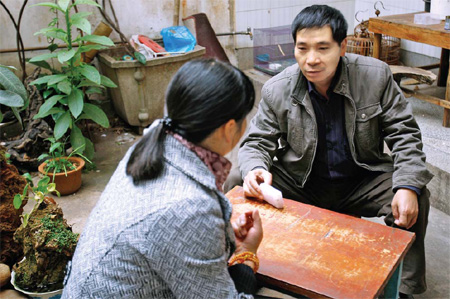Focus
Activists face uphill battle against AIDS
By Duan Yan and Shan Juan (China Daily)
Updated: 2010-12-01 08:05
 |
Large Medium Small |
Campaigners say it is increasingly difficult to trace fearful prostitutes driven underground. Duan Yan and Shan Juan in Yunnan report.
Xiao Xiao wiped tears from her reddened eyes. She starts crying whenever she thinks about her days as a prostitute in a nightclub.
Sitting in a quiet coffee shop in Yuxi, Yunnan province, the petite, pale-skinned 30-year-old had agreed to talk about her struggle with HIV but became upset when the subject turned to her "disappearance" in 2002.
That year, she said, all employees at the club were given blood tests.
"I didn't know it was a HIV test," she said, although not long after getting the results, she left her job.
For three years, officials with the city's center for disease control (CDC) were unable to trace Xiao (not her real name).
She reappeared when she was hospitalized with a life-threatening fever.
"We were trying to contact you (all that time) but we couldn't find you," Li Lianxue, a doctor with the Hongta district CDC, said to Xiao as they chatted about the past over a coffee last week.
"I had no idea", was her only reply.
As China marks World AIDS Day on Wednesday, anti-AIDS campaigners say keeping track of HIV-infected sex workers is one of their greatest challenges - not least because of police crackdowns.
"Crackdowns do little for disease control, they just drive prostitutes further underground, which undermines efforts to reach them and deliver intervention education," said Jing Jun, director of Tsinghua University's social policy institute.
Following the closure of an infamous nightclub in Beijing in June this year, authorities across China, including in Yuxi, launched fresh campaigns against the sex industry.
"We are determined to put an end to ... illegal activities in the entertainment places," said Qian Jin, deputy director of the security corps under Beijing's public security bureau.
However, health professionals in Hongta, who have spent eight years raising awareness of HIV and AIDS, fear plans to shut the 100 or so "entertainment venues" they regularly visit will mean losing all contact with the sex workers employed there, including those infected.
Of the 614 women given health exams in the district this year, only one tested positive for the virus. She has already disappeared from the CDC's radar, admitted Li Lianxue.
"This year, we've given out more than 100,000 condoms at these venues but it's far from enough," said Ma Yi, deputy director of Hongta CDC, who said that a prostitute at a "hair salon" can use up to eight condoms a day.
Flipping through the monthly free condom distribution records, Li Jinlin, the CDC doctor in charge of contacting venues, said more than 70 "hair salons" were closed by police last month, meaning they now only have records for sex workers at 21 nightclubs.
"Experience has shown that cracking down on sex work and driving it further underground is likely to make sex workers reluctant to accept services and make it difficult for health workers to gain access to them," said Mark Stirling, China coordinator for UNAIDS. "Interventions that respect the rights of sex workers can be highly effective."
As prostitution is illegal in China, there is no official number for how many people are involved in the business, although experts estimate the figure is roughly 3 million nationwide.
Police used to take possession of condoms as evidence to arrest a suspected sex worker or customer. However, that rule has been changed in Yuxi as part of a trial project to better coordinate the work of CDC officials and public security bureaus in AIDS prevention.
"Reaching out to (sex workers) with safe sex education and free condoms is important and benefits China's overall battle against HIV and AIDS," said Lu Lin, director of Yunnan's provincial CDC.
Official studies show the prevalence of HIV and AIDS among prostitutes is about 1 percent (compared to 0.05 percent for the general public). In Hongta, though, that percentage has fallen from 2 percent to 0.7 percent since the project started.
Lu said the model will gradually be expanded to surrounding counties.
Hao Yang, deputy director of the disease prevention and control bureau under the Ministry of Health, said it is unlikely the project will be rolled out nationwide in the short term, however. "Due to policy and legal restraints, it's hard to expand the model across the country," he said. "But that doesn't mean we should stop trying."

